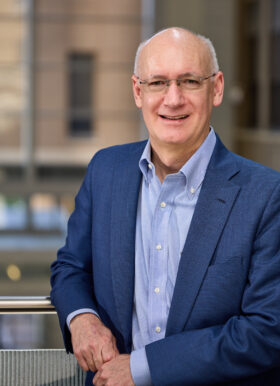
A word from our Chair
David Piston, PhD
Welcome to the Department of Cell Biology & Physiology at Washington University in St. Louis. For more than a century, our department has led the basic science research that has been the foundation for one of the elite medical schools in the country. We remain committed to discovering and understanding the fundamental mechanisms that govern cell function in the context of tissues, organs, and whole organisms. These mechanisms are complex and often interact in ways that lead to emergent behaviors, which are difficult to understand from reductionist approaches. From the beginning, researchers in our department have pushed the envelope of what is possible, thereby leveraging new experimental approaches into mechanistic insight. In fact, our inaugural department chair, Joseph Erlanger, first used oscilloscopes to study nerve electrical activity, leading to the discovery of action potentials and showing the importance of technical breakthroughs for biological discovery.
Today, we are continuing to tackle the problem of how molecular and cellular mechanisms underlie the pathophysiology of human disease. We are just beginning to appreciate the vast complexity of biological systems and how this complexity is integrated in such a way that leads to the robust structure and function of the whole body. Research in our department increasingly relies on quantitative measurements and predictive modeling of dynamic networks that contain interacting genes, proteins, and cells organized across multiple spatial and temporal scales. Advances in genomics, proteomics, and imaging enable us to produce large datasets on genes, proteins and cellular function, both in health and disease, which yield large and complex catalogs of potential networks. However, the complexity of these networks means that we cannot hope to obtain complete datasets, so we are adapting established tools from the physical sciences and engineering to integrate our quantitative yet incomplete biological information and make predictions about the overall system behavior.
The Department of Cell Biology & Physiology comprises an interactive group of 16 independent laboratories. We champion diversity in our people and our research interests, which include including cell motility, cell signaling, cell cycle regulation, DNA repair, RNA biology, extracellular matrix, prions, membrane and organelle trafficking, structure and function of ion channels, transporters and pumps as well as molecular and cellular imaging. A hallmark of Washington University is its culture of collaboration. Working with collaborators from throughout the School of Medicine, the College of Arts and Sciences, and the School of Engineering & Applied Science, we are answering key biomedical questions of our era and educating leaders among the physicians, scientists, and physician-scientists of the future. In addition, our faculty are active members of interdisciplinary centers including the Alvin J. Siteman Cancer Center, the HOPE Center for Neurological Disorders, the Center of Membrane Excitability Diseases (CIMED), and the Integrating Communication within the Cancer Environment (ICCE) Institute. Through these collaborations within the rich intellectual environment of Washington University, the faculty, postdocs, students, and staff of the Department of Cell Biology & Physiology are poised to tackle key questions in cell biology and physiology and translate their findings to improved health outcomes in the community.